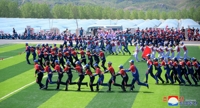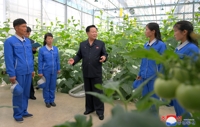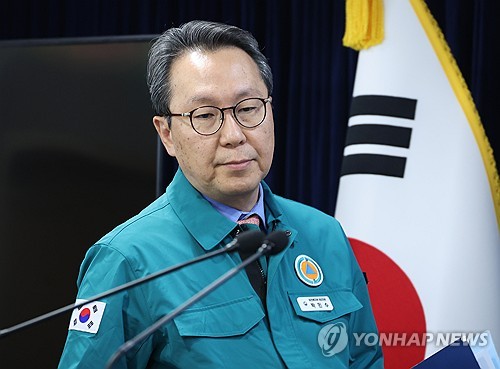(LEAD) U.S. annual report highlights forced repatriations, numerous human rights abuses in N. Korea
(ATTN: UPDATES with more info in paras 18-21)
By Song Sang-ho
WASHINGTON, April 22 (Yonhap) -- North Koreans remained exposed to a wide range of human rights abuses last year, including forced repatriations, extrajudicial killings, forced abortion and the "worst forms" of child labor, the State Department said in its annual report Monday, citing "credible" reports of such incidents.
The department released the 2023 Country Reports on Human Rights Practices, pointing out that the recalcitrant regime in Pyongyang did not take "credible steps" to identify and punish officials who may have committed human rights abuses.
Required by law to be submitted to Congress, the report documents the status of respect for human rights and workers' rights in nearly 200 countries and territories. It is based on various resources, including media, nongovernmental organization (NGO) and U.N. reports.
The report, in particular, took note of North Koreans being repatriated as pandemic-driven restrictions have started to loosen.
"The country began to ease added restrictions on cross-border travel that it imposed at the start of the COVID-19 pandemic, and there were reports that forced repatriations of North Koreans resumed," the department said in the report.
The issue of repatriations has been a key human rights topic for the U.S. amid concerns that North Korean escapees could face harsh treatment when they are sent back home. Washington has been calling for relevant countries to abide by the international principle of non-refoulement.
The report enumerated a wide range of other reported abuses in the North, including arbitrary or unlawful killings, including extrajudicial killings, and torture or inhuman treatment or punishment by government authorities.
It also cited reports on involuntary or coercive medical practices, harsh prison conditions, including political prison camps, as well as instances of coerced abortion or forced sterilization, and trafficking in persons, including forced labor.
The report underscored that there were "numerous" reports about the North Korean government and its agents having committed extrajudicial killings and other arbitrary executions.
"There was no indication the government acted to investigate such killings or punish officials involved; instead, such killings appeared to be a feature of authorities' system of governance and control," the department said in the report.
It also touched on reported cases of infanticide and forced abortion, particularly involving mothers who were political prisoners, persons with disabilities, victims of rape by state officials, or individuals repatriated from China.
"Defectors, media, NGOs, and U.N. officials reported many prisoners died from torture, disease, starvation, exposure to the elements, or a combination of these causes," it said.
Regarding child labor, the department cited NGO reports that government officials held thousands of children and forced them to work in labor camps with their parents.
Moreover, the report depicted the harsh reality facing North Koreans seeking to flee their country.
"Escapee, NGO, and media reports indicated those attempting to leave the country without permission could be killed on the spot or publicly executed, and guards at political prison camps were under orders to shoot to kill those attempting to escape," it said.
At public executions, the regime subjected private citizens to attend, it noted, citing a Radio Free Asia report in September that some 2,500 residents were forced to gather at an airport in Hyesan, a city in the northeastern province of Ryanggang, to watch the execution of nine people for allegedly operating an illegal beef distribution ring.
On the total number of political prisoners or detainees, the report estimated a range between 80,000 and 120,000, though no definitive information was available regarding the number. Some NGOs placed the figure as high as 200,000, the report said.
Regarding South Korea, the department mentioned reports of restrictions on freedom of expression and laws criminalizing consensual same-sex sexual conduct between adults in the military. But it said that Seoul took steps to identify, investigate, prosecute, and punish officials for human rights abuses.
During a press conference on the report, Robert Gilchrist, a senior official from the department's Bureau of Democracy, Human Rights, and Labor, said that Secretary of Antony Blinken will discuss with Chinese officials the "full" array of human rights concerns during his trip to Beijing this week.
He was responding to a question about China's reported use of North Korean workers and its repatriation of North Korean escapees.
"He will, as he does in all of his engagements with the PRC, raise human rights at the highest levels and in the clearest way," he said. PRC stands for China's official name, the People's Republic of China.
Blinken touted the comprehensive report as a "factual" and "systematic" account of human rights records across the globe in nearly 200 countries and territories.
"Each one is held to the same standard -- developed, developing countries, competitors as well as allies and partners," he told reporters.
He also recognized that the U.S. also faces its own "shortcomings."
"The strength of democracies like ours is that we address those shortcomings, those imperfections open without sweeping under the rug," he said.

U.S. Secretary of State Antony Blinken address a press conference at the State Department in Washington on April 22, 2024. (Yonhap)
sshluck@yna.co.kr
(END)
-
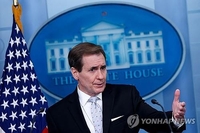 (3rd LD) Russia sent more than 165,000 barrels of refined petroleum to N. Korea in March: White House
(3rd LD) Russia sent more than 165,000 barrels of refined petroleum to N. Korea in March: White House -
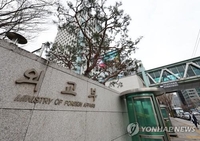 Anti-terrorism alert raised for 5 overseas S. Korean diplomatic missions
Anti-terrorism alert raised for 5 overseas S. Korean diplomatic missions -
 S. Korean military shoots down unidentified balloon near western maritime border in March
S. Korean military shoots down unidentified balloon near western maritime border in March -
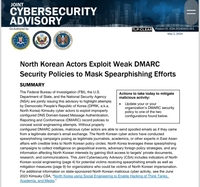 U.S. releases new cybersecurity advisory against N.K.-linked cyber incursion group
U.S. releases new cybersecurity advisory against N.K.-linked cyber incursion group -
 Hybe's sublabel head demanded unilateral contract termination authority for NewJeans: sources
Hybe's sublabel head demanded unilateral contract termination authority for NewJeans: sources
-
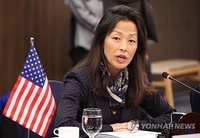 (News Focus) U.S. focus on 'interim' steps with N. Korea raises questions about policy direction
(News Focus) U.S. focus on 'interim' steps with N. Korea raises questions about policy direction -
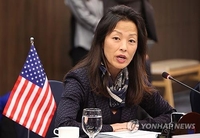 U.S. focus on 'interim' steps with N. Korea raises questions about policy direction
U.S. focus on 'interim' steps with N. Korea raises questions about policy direction -
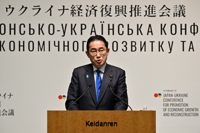 (News Focus) Cautious hopes reemerge for Japan's role over N. Korean nuclear conundrum
(News Focus) Cautious hopes reemerge for Japan's role over N. Korean nuclear conundrum -
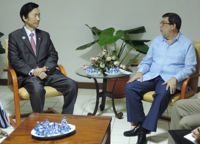 S. Korea's forming of diplomatic ties with Cuba signals deeper Latin America ties, deals blow to N. Korea
S. Korea's forming of diplomatic ties with Cuba signals deeper Latin America ties, deals blow to N. Korea -
 Trump's NATO remarks renew worries about U.S. commitment to alliance, N.K. deterrence
Trump's NATO remarks renew worries about U.S. commitment to alliance, N.K. deterrence








